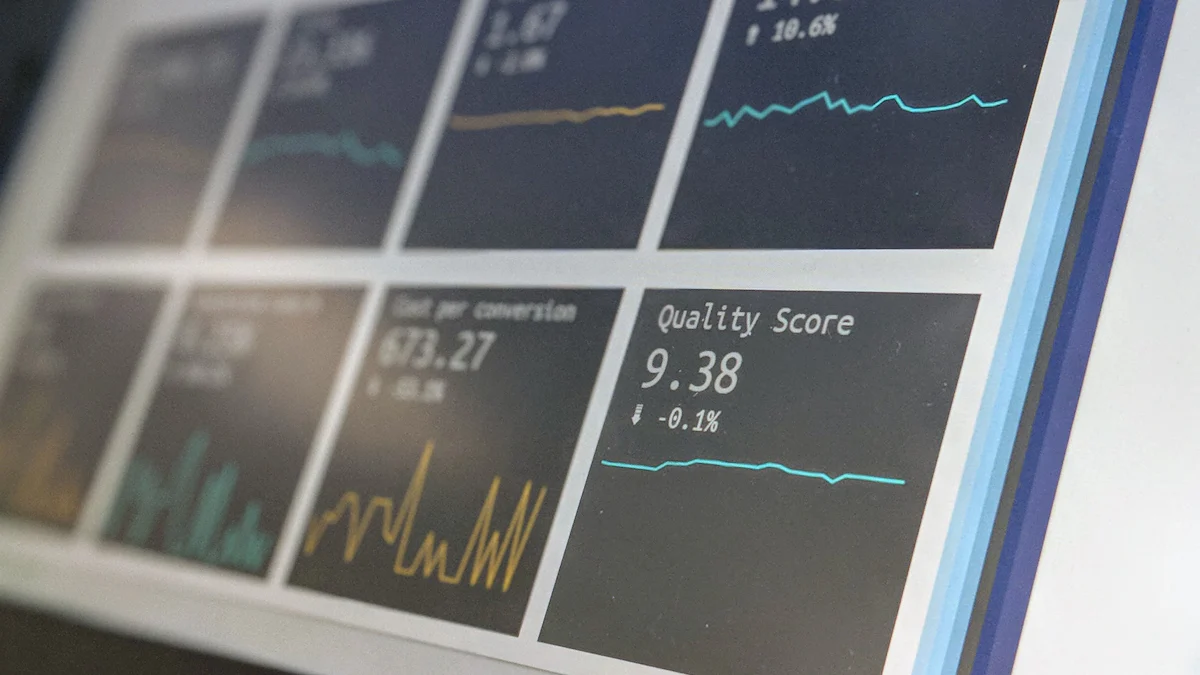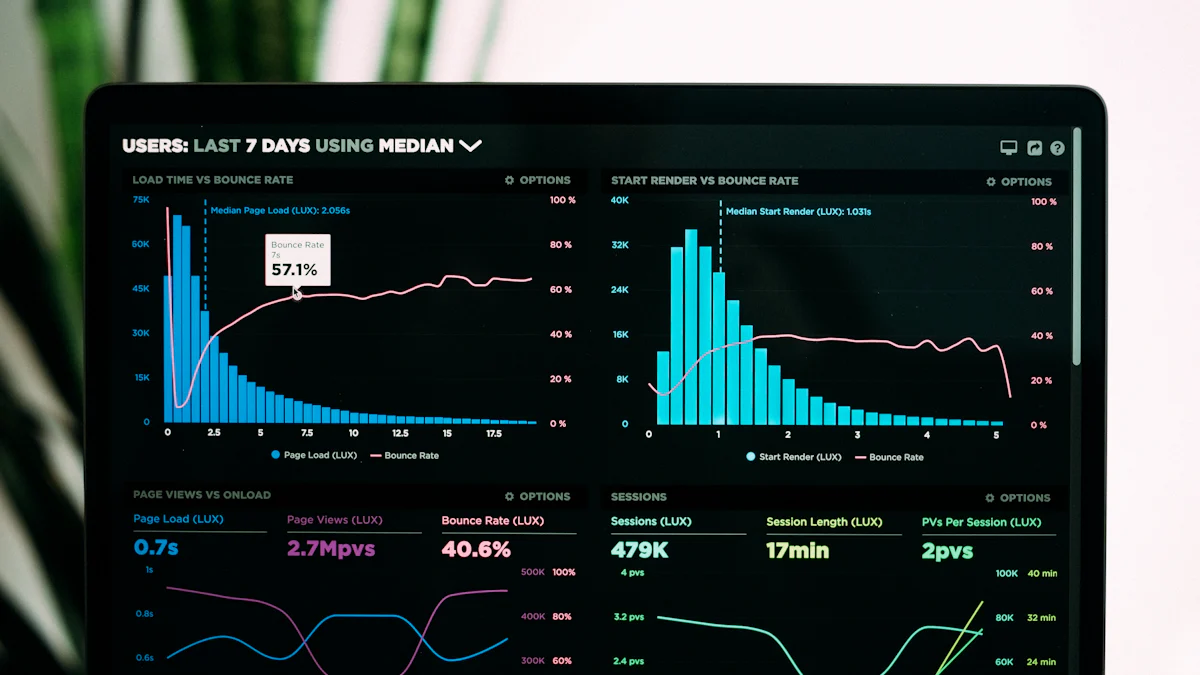

Healthcare Business Intelligence
Sean, Industry Editor
Oct 08, 2024

Healthcare Business Intelligence (BI) transforms how you approach patient care and operational efficiency. It involves using data-driven insights to make informed decisions, ultimately enhancing the quality of healthcare services. The importance of BI in healthcare is growing rapidly. The market is projected to reach $25.86 billion by 2032, driven by technological advancements and the need to manage chronic disorders. By integrating BI tools, you can revolutionize patient care, personalize treatment plans, and manage risks effectively. This blog aims to delve into the components and significance of this transformative approach.
Understanding Healthcare Business Intelligence
Definition and Scope of Healthcare Business Intelligence
Healthcare Business Intelligence (BI) involves using data to make informed decisions in healthcare. You can think of it as a tool that transforms raw data into meaningful insights. This helps improve patient care and operational efficiency.
Key Components
-
Data Collection: Gather information from various sources like electronic health records (EHRs) and medical devices.
-
Data Analysis: Use tools to interpret the data and find patterns or trends.
-
Reporting: Create visual reports and dashboards to present the findings clearly.
Data Sources in Healthcare
Healthcare BI relies on diverse data sources:
-
Electronic Health Records (EHRs): Store patient information digitally.
-
Medical Devices: Provide real-time health data.
-
Administrative Systems: Include billing and scheduling information.
Historical Context of Healthcare Business Intelligence
Understanding the history of BI in healthcare helps you appreciate its current role.
Evolution of Business Intelligence in Healthcare
In the 1990s, healthcare analytics began to gain recognition. The introduction of Artificial Intelligence systems marked a significant shift. These systems started to revolutionize patient care by enabling data-driven decisions.
Technological Advancements
New BI technologies allow quick analysis of vast health data. You can now analyze biometrics, patient results, and health sensors efficiently. This advancement improves decision-making and enhances patient care standards. Hospitals have seen decreased wait times and optimized staffing levels due to these innovations.
Core Components of Healthcare Business Intelligence
Data Warehousing
Data warehousing plays a crucial role in Healthcare Business Intelligence. You store vast amounts of data from various sources in a centralized location. This storage allows you to access and analyze information efficiently.
Role in Data Storage
Data warehousing helps you organize and store data systematically. By doing so, you ensure that healthcare providers can retrieve patient records, treatment histories, and other essential information quickly. This organization enhances decision-making and improves patient care.
Integration with Other Systems
Integration with other systems is vital. You connect data warehouses with electronic health records (EHRs), medical devices, and administrative systems. This connectivity ensures seamless data flow, enabling comprehensive analysis and insights.
Data Analytics
Data analytics is at the heart of Healthcare Business Intelligence. It transforms raw data into actionable insights, helping you make informed decisions.
Predictive Analytics
Predictive analytics allows you to foresee potential health issues. By analyzing patterns and trends, you can anticipate patient needs and reduce emergency interventions. This proactive approach enhances operational efficiency and patient outcomes.
Descriptive Analytics
Descriptive analytics helps you understand past events. By examining historical data, you identify trends and patterns. This understanding aids in tracking treatment outcomes and adjusting care plans swiftly.
Reporting tools are essential for presenting data clearly. They help you visualize complex information, making it easier to interpret and act upon.
Reporting tools are essential for presenting data clearly. They help you visualize complex information, making it easier to interpret and act upon.
Dashboards
Dashboards provide you with real-time insights. They display key performance indicators (KPIs) and metrics in an easy-to-understand format. This visualization helps you monitor quality and safety issues effectively.
Custom Reports
Custom reports allow you to tailor information to specific needs. You can create detailed analyses that focus on particular areas, such as resource management or financial performance. These reports guide accurate treatment decisions and strategic planning.
Healthcare Business Intelligence empowers you to enhance patient care and operational efficiency. By leveraging data warehousing, analytics, and reporting tools, you transform healthcare delivery. This approach not only improves patient outcomes but also streamlines processes and reduces costs.
Applications of Healthcare Business Intelligence

Clinical Decision Support
Healthcare Business Intelligence (BI) plays a pivotal role in clinical decision support. By leveraging data, you can enhance patient care and reduce errors.
Enhancing Patient Care
You can use BI tools to analyze patient data and create personalized treatment plans. For instance, the Mayo Clinic utilizes healthcare BI to identify and treat rare diseases. This approach not only improves patient outcomes but also optimizes resource allocation. By tailoring treatments to individual needs, you ensure that patients receive the most effective care possible.
Reducing Errors
BI helps you minimize errors in patient care. Predictive analytics allows you to foresee potential complications and intervene early. By analyzing patterns in patient data, you can identify risk factors and take preventive measures. This proactive approach reduces the likelihood of medical errors and enhances overall patient safety.
Operational Efficiency
Healthcare BI significantly boosts operational efficiency. It streamlines processes and improves resource management, ensuring that healthcare facilities run smoothly.
Streamlining Processes
You can use BI to streamline various healthcare processes. By analyzing workflow data, you identify bottlenecks and implement solutions to improve efficiency. For example, BI tools help hospitals manage patient flow, reducing wait times and enhancing the patient experience. Efficient processes lead to better patient care and increased satisfaction.
Resource Management
Effective resource management is crucial in healthcare. BI provides insights into resource utilization, helping you allocate staff and equipment more efficiently. By understanding demand patterns, you can optimize scheduling and reduce operational costs. This strategic approach ensures that resources are used effectively, improving both patient care and financial performance.
Financial Management
Healthcare BI offers valuable insights into financial management. It aids in cost reduction and revenue cycle management, ensuring the financial health of healthcare organizations.
Cost Reduction
You can use BI to identify areas where costs can be reduced. By analyzing financial data, you pinpoint inefficiencies and implement cost-saving measures. For instance, the Mayo Clinic's use of BI has significantly lowered operational costs. By optimizing resource allocation and reducing waste, you enhance the financial sustainability of your organization.
Revenue Cycle Management
BI tools assist in managing the revenue cycle effectively. By tracking billing and payment processes, you identify areas for improvement and ensure timely reimbursements. This comprehensive approach enhances cash flow and financial stability. By leveraging BI, you can optimize revenue management and support the long-term success of your healthcare facility.
Benefits of Healthcare Business Intelligence
Improved Patient Outcomes
Healthcare Business Intelligence (BI) significantly enhances patient outcomes. By utilizing data-driven insights, you can tailor treatment plans to meet individual needs.
Personalized Treatment Plans
You can create personalized treatment plans using BI tools. These tools analyze patient data to identify specific health needs. For example, healthcare providers use BI to customize care for patients with chronic conditions. This approach ensures that each patient receives the most effective treatment, improving overall health outcomes.
Early Disease Detection
BI aids in the early detection of diseases. By analyzing patterns in patient data, you can identify potential health issues before they become severe. This proactive approach allows for timely interventions, reducing the risk of complications. Early detection not only improves patient outcomes but also lowers healthcare costs by preventing advanced-stage treatments.
Enhanced Data-Driven Decisions
BI empowers you to make informed decisions based on solid evidence. This leads to more effective healthcare practices and strategic planning.
Evidence-Based Practices
You can implement evidence-based practices using BI insights. By analyzing clinical data, you identify the most effective treatments and procedures. This approach ensures that healthcare providers follow best practices, enhancing patient care quality. Evidence-based practices lead to better health outcomes and increased patient satisfaction.
Strategic Planning
BI supports strategic planning in healthcare organizations. By analyzing operational data, you can identify areas for improvement and allocate resources effectively. This strategic approach enhances organizational efficiency and ensures that healthcare facilities meet patient needs. With BI, you can plan for future challenges and opportunities, ensuring long-term success.
Increased Efficiency
BI tools streamline healthcare operations, leading to increased efficiency. You can save time and reduce waste by optimizing processes.
Time Savings
BI helps you save time by automating routine tasks. For instance, BI tools can automate data entry and reporting, freeing up staff to focus on patient care. This efficiency reduces wait times and enhances the patient experience. By saving time, healthcare providers can deliver more timely and effective care.
Reduced Waste
You can reduce waste in healthcare settings using BI insights. By analyzing resource utilization, you identify areas where waste occurs and implement corrective measures. For example, BI tools help optimize inventory management, reducing excess supplies and costs. This approach ensures that resources are used efficiently, improving both financial performance and patient care quality.
Survey Results:
-
66% of US healthcare providers have embraced predictive analytics, highlighting the growing importance of BI in healthcare.
-
BI helps optimize staffing, reduce workload, and save costs, making it an invaluable tool for healthcare professionals.
-
Effective treatment relies on the seamless exchange of patient information, facilitated by healthcare BI solutions.
Challenges and Considerations of Healthcare Business Intelligence
Data Privacy and Security
Ensuring data privacy and security is crucial in healthcare business intelligence. You must comply with regulations like HIPAA to protect patient information. This involves implementing robust security measures.
Compliance with Regulations
You need to adhere to strict regulations to safeguard patient data. HIPAA standards require encryption, access controls, and audit trails. These measures prevent unauthorized access and data breaches. By following these guidelines, you ensure that patient information remains confidential.
Protecting Patient Information
Protecting patient information demands constant vigilance. Advanced safeguards and continuous monitoring are essential. Techniques like data anonymization help maintain confidentiality. You must focus on securing data from wearable devices and other sources. This ensures that sensitive information stays protected.
Implementation Barriers
Implementing healthcare business intelligence can present challenges. You may face issues related to cost and resource allocation, as well as staff training and adoption.
Cost and Resource Allocation
Allocating resources effectively is vital. Implementing BI systems can be costly. You need to plan budgets carefully and allocate resources wisely. This includes investing in technology and infrastructure. By managing costs, you can ensure a successful implementation.
Staff Training and Adoption
Training staff is crucial for successful BI adoption. You must provide comprehensive training programs. This helps staff understand and utilize BI tools effectively. Encouraging adoption requires clear communication and support. By fostering a culture of learning, you can overcome resistance and enhance the use of BI in your organization.
Future Trends in Healthcare Business Intelligence

AI and Machine Learning
Artificial Intelligence (AI) and Machine Learning (ML) are transforming healthcare business intelligence. These technologies help you identify trends, improve patient outcomes, and enhance operational efficiency.
Predictive Modeling
Predictive modeling uses AI to forecast future health events. You can analyze patient data to predict potential health issues. This foresight allows you to intervene early, improving patient care and reducing emergency visits. For example, AI can predict which patients are at risk of developing chronic conditions, enabling timely preventive measures.
Automation
Automation streamlines healthcare processes. AI automates routine tasks, freeing up your time for more critical activities. You can automate data entry, appointment scheduling, and even some diagnostic procedures. This efficiency reduces errors and enhances the patient experience. By automating repetitive tasks, you ensure that healthcare providers focus on delivering quality care.
Scientific Research Findings:
-
AI in Healthcare Analytics and Business Intelligence: AI and ML are revolutionizing healthcare analytics by identifying trends and improving patient outcomes.
-
AI's Impact on Healthcare Efficiency and Patient Outcomes: AI optimizes healthcare processes, reducing costs and enhancing patient care.
Real-Time Analytics
Real-time analytics provides immediate insights into healthcare operations. You can monitor patient data continuously, allowing for quick decision-making.
Immediate Insights
Immediate insights help you respond swiftly to changing conditions. Real-time data allows you to track patient vitals, medication administration, and treatment progress. This information enables you to make informed decisions quickly, improving patient outcomes. For instance, real-time analytics can alert you to potential adverse reactions, allowing for prompt intervention.
Continuous Monitoring
Continuous monitoring ensures that you maintain high standards of care. By tracking patient data around the clock, you can detect anomalies and address them promptly. This vigilance enhances patient safety and reduces the risk of complications. Continuous monitoring also supports proactive care, ensuring that you provide timely interventions when needed.
Scientific Research Findings:
-
Growing Role of Artificial Intelligence in Healthcare: Statistics show significant growth in the healthcare AI market, highlighting its increasing importance.
-
Artificial Intelligence in Healthcare: Transforming Patient Care: AI technologies have the potential to transform various aspects of healthcare, including patient care and administrative processes.
By embracing these future trends, you can revolutionize healthcare delivery. AI, machine learning, and real-time analytics empower you to enhance patient care, streamline operations, and reduce costs. These advancements ensure that you stay at the forefront of healthcare innovation, providing the best possible outcomes for your patients.
Case Studies and Examples of Healthcare Business Intelligence
Successful Implementations
Hospital Systems
Healthcare Business Intelligence (BI) has transformed hospital systems. You can see this in how hospitals use data analytics to improve patient outcomes and operational efficiency. For example, a major hospital network implemented BI tools to analyze patient flow. This led to reduced wait times and optimized staffing. By using real-time data, hospitals can make informed decisions that enhance patient care.
Private Practices
Private practices also benefit from BI. You can leverage data to personalize patient care and streamline operations. A small clinic used BI to track patient appointments and treatment plans. This approach improved scheduling efficiency and patient satisfaction. By adopting BI, private practices can offer tailored care and manage resources effectively.
Lessons Learned
Best Practices
Implementing BI in healthcare requires following best practices. You should focus on integrating data from various sources like electronic health records and medical devices. This integration ensures comprehensive insights. Regular training for staff is essential. It helps them understand and utilize BI tools effectively. By fostering a data-driven culture, you can maximize the benefits of BI.
Common Pitfalls
Avoiding common pitfalls is crucial for successful BI implementation. You might face challenges with data privacy and security. Ensuring compliance with regulations like HIPAA is vital. Another common issue is resistance to change. Encouraging staff adoption through clear communication and support can overcome this barrier. By addressing these challenges, you can ensure a smooth transition to BI.
"Data analytics in healthcare drives unprecedented improvements in patient outcomes, operational efficiencies, and research advancements."
By learning from these case studies, you can harness the power of Healthcare Business Intelligence to transform your practice.
Healthcare business intelligence is essential for transforming the healthcare landscape. It empowers you to make informed decisions, enhancing patient care and operational efficiency. By integrating BI tools, you can convert raw data into actionable insights, improving outcomes through predictive analytics and streamlined operations. Embrace this technology to revolutionize your healthcare practice. The adoption of business intelligence not only optimizes resource management but also ensures better patient care. As you move forward, consider the immense value BI brings to your organization, paving the way for a more efficient and effective healthcare system.
FAQ
Healthcare Business Intelligence (BI) involves using data analytics to improve decision-making in healthcare settings. It transforms complex datasets into actionable insights, enhancing patient care and operational efficiency.
You can optimize processes and improve patient outcomes by integrating BI tools. BI helps you refine everything from patient admissions to discharge protocols, ensuring peak performance in healthcare operations.
BI tools analyze patient data to create personalized treatment plans. This approach ensures that each patient receives the most effective care, improving overall health outcomes and reducing medical errors.
Data Collection: Gather information from sources like electronic health records (EHRs).
Data Analysis: Use tools to interpret data and identify trends.
Reporting: Present findings through visual reports and dashboards.
By analyzing workflow data, BI identifies bottlenecks and suggests solutions. This streamlining of processes reduces wait times and enhances resource management, leading to better patient care and satisfaction.
You may encounter issues related to data privacy, security, and cost. Ensuring compliance with regulations like HIPAA and providing staff training are crucial for successful implementation.
AI and Machine Learning: These technologies enhance predictive modeling and automate routine tasks.
Real-Time Analytics: Provides immediate insights, allowing for quick decision-making and continuous monitoring.
BI tools help you manage the revenue cycle effectively by tracking billing and payment processes. This comprehensive approach enhances cash flow and financial stability, supporting the long-term success of healthcare facilities.
Continue Reading About Healthcare Business Intelligence
15 Best Software Reporting Tools for 2025
Explore the top 15 software reporting tools for 2025. Compare features, pricing, and usability to find the best fit for your business needs.
Lewis
Oct 08, 2024
2025 Data Pipeline Examples: Learn & Master with Ease!
Unlock 2025’s Data Pipeline Examples! Discover how they automate data flow, boost quality, and deliver real-time insights for smarter business decisions.
Howard
Feb 24, 2025
2025 Best Data Integration Solutions and Selection Guide
Explore top data integration solutions for 2025, enhancing data management and operational efficiency with leading platforms like Fivetran and Talend.
Howard
Dec 19, 2024
Which Data Analysis Projects Work Best for Beginners?
Ready to shine in 2025? Discover easy data analysis projects to boost your portfolio, learn data cleaning, visualization, and tackle real-world challenges!
Lewis
Mar 10, 2025
Augmented Analytics: Unlock the Core Concepts & Benefits!
Discover augmented analytics—where AI and ML automate data prep and insights, revolutionizing decision-making for smarter, faster business strategies!
Lewis
Mar 04, 2025
Covers Dashboard: Find Your Perfect Match
Choose the perfect covers dashboard to protect and style your car, enhancing its interior and resale value with the right material and fit.
Lewis
Nov 05, 2024


